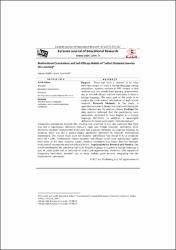| dc.contributor.author | Şener, Sabriye | |
| dc.contributor.author | Erol, İsmail Kaan | |
| dc.date.accessioned | 2020-11-20T14:55:00Z | |
| dc.date.available | 2020-11-20T14:55:00Z | |
| dc.date.issued | 2017 | |
| dc.identifier.issn | 1302-597X | |
| dc.identifier.uri | https://doi.org/10.14689/ejer.2017.67.15 | |
| dc.identifier.uri | https://hdl.handle.net/20.500.12809/2196 | |
| dc.description | WOS: 000397581400011 | en_US |
| dc.description.abstract | Purpose: There has been a concern as to what motivates people to learn a foreign language among researchers. Another concern in EFL context is that students may not benefit from learning opportunities due to low self-efficacy and low motivation to learn a foreign language. The main goal of this study is to explore the motivational orientations of high school students. Research Methods: In the study, a quantitative research design was employed during the data collection and the analysis phases. Findings The data analysis indicated that the participants were moderately motivated to learn English as a foreign language (M=92.62). In addition, a meaningful difference between participants' instrumental and integrative orientations towards EFL learning was observed. It was also indicated that there was not a significance difference between male and female students' motivation level. However, students' instrumental motivation had a greater influence on language learning. In addition, there was not a gender-related significant difference in students' motivational orientations. The overall mean score for students' self-efficacy was found to be at moderate level (M = 3.88). Furthermore, female students' self-efficacy scores were significantly higher than those of the male students. Lastly, positive correlation was found between students' motivational orientations and self-efficacy beliefs. Implications for Research and Practice: The results emphasized the importance given to English language as a primary foreign language, a part of career paths and an indicator of various job opportunities. However, with support of integrative motivation, students' can set more realistic goals towards integrating into the international community. (C) 2017 Ani Publishing Ltd. All rights reserved | en_US |
| dc.item-language.iso | eng | en_US |
| dc.publisher | Ani Yayincilik | en_US |
| dc.item-rights | info:eu-repo/semantics/openAccess | en_US |
| dc.subject | Affective Factors | en_US |
| dc.subject | Integrative | en_US |
| dc.subject | Motivation | en_US |
| dc.subject | Instrumental Motivation | en_US |
| dc.subject | Confidence | en_US |
| dc.title | Motivational Orientations and Self-Efficacy Beliefs of Turkish Students towards EFL Learning | en_US |
| dc.item-type | article | en_US |
| dc.contributor.department | MÜ, Eğitim Fakültesi, Yabancıl Diller Eğitimi Bölümü | en_US |
| dc.contributor.institutionauthor | Şener, Sabriye | |
| dc.contributor.institutionauthor | Erol, İsmail Kaan | |
| dc.identifier.doi | 10.14689/ejer.2017.67.15 | |
| dc.identifier.issue | 67 | en_US |
| dc.identifier.startpage | 251 | en_US |
| dc.identifier.endpage | 267 | en_US |
| dc.relation.journal | Eurasian Journal of Educational Research | en_US |
| dc.relation.publicationcategory | Makale - Uluslararası Hakemli Dergi - Kurum Öğretim Elemanı | en_US |


















